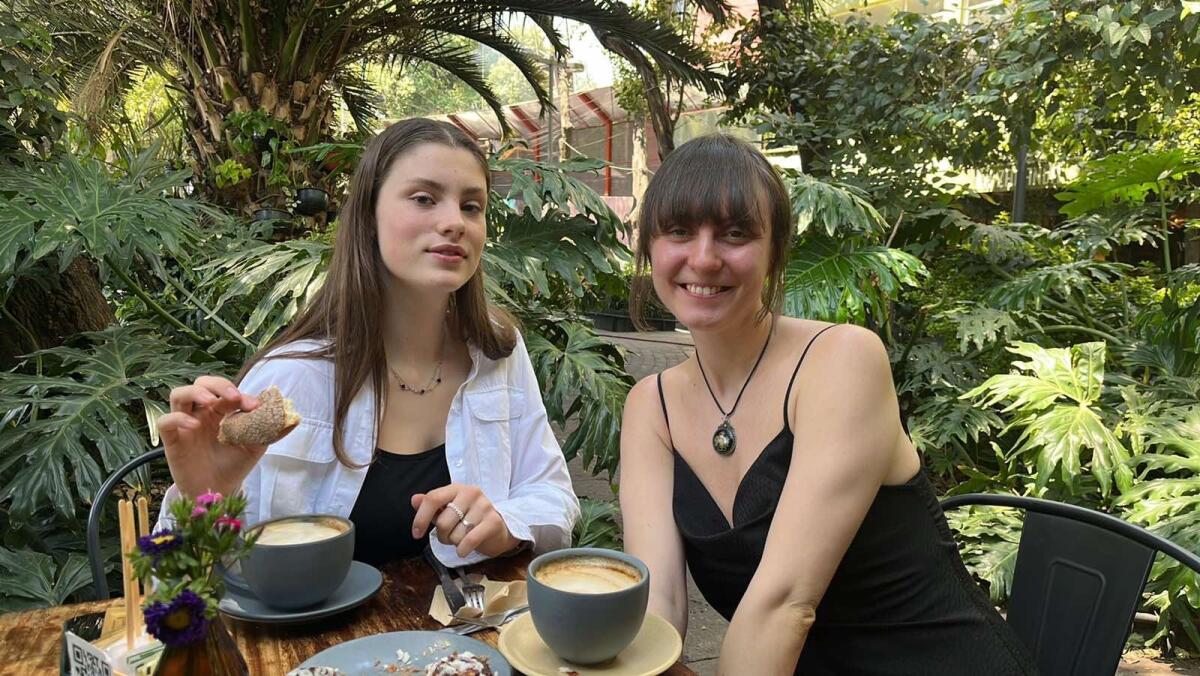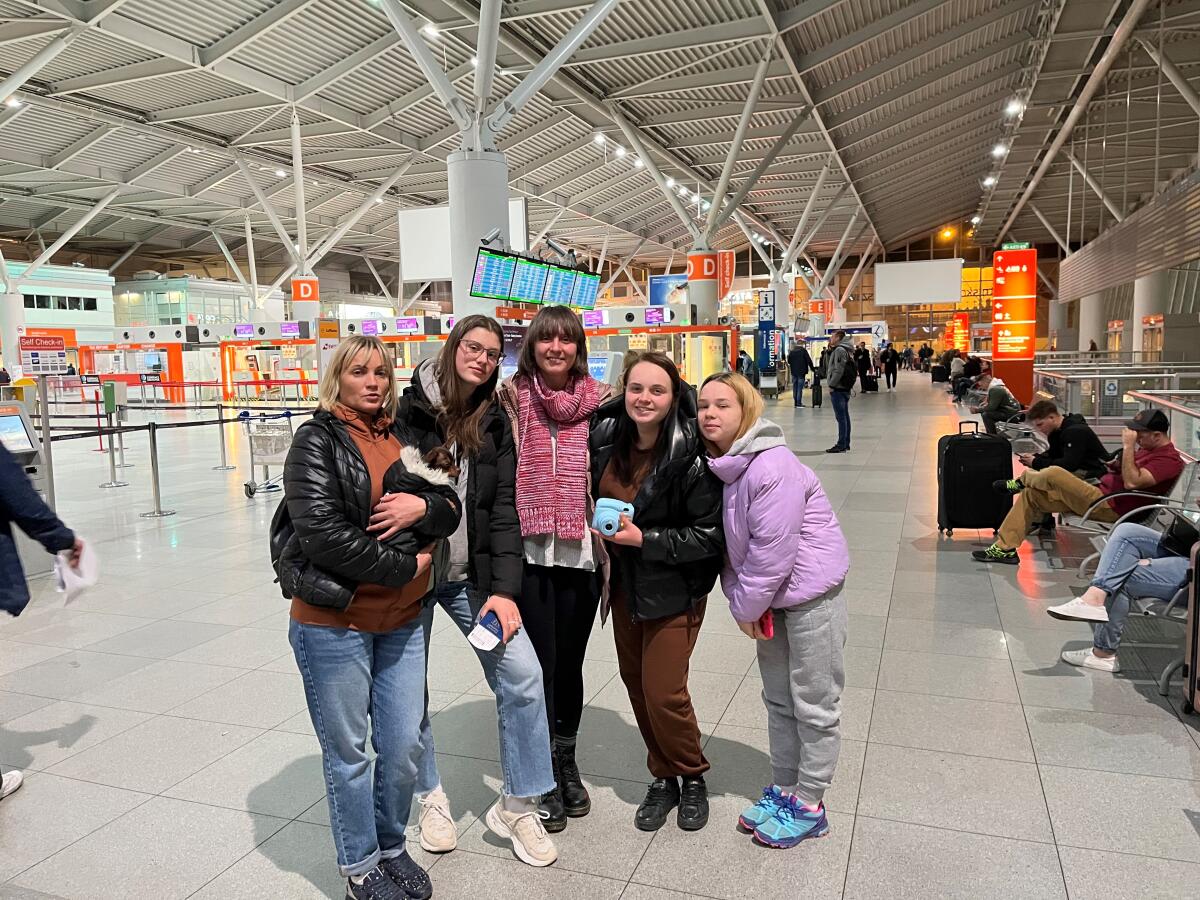A Ukrainian minor’s separation from caregiver at San Diego border shows trauma behind policy

- Share via
SAN DIEGO — After her family fled to Poland because of Russia’s invasion of Ukraine, Yelyzaveta Krasulia and her mother made a difficult decision — they would separate so that the mother could care for loved ones who didn’t have passports valid to travel further, and Yelyzaveta would go to the United States with a close family friend.
At the San Diego-Tijuana border, the 17-year-old Ukrainian girl was separated from that family friend and placed in a holding cell. Days later, she was sent to New York to a facility for unaccompanied migrant children.
Though family separation in 2018 became a buzzword for the Trump administration’s practices of separating parents from children and prosecuting the parents for having crossed the border, separations of relatives including grandparents, aunts, uncles and cousins from minors have gone on much longer and continue today.
The family friend, Molly Surazhsky, a 29-year-old U.S. citizen whose parents emigrated from Ukraine, called the experience horrific.
“I’m responsible for this girl,” Surazhsky said. “This whole process has been extremely emotional. I feel that this is on my shoulders.”
Surazhsky, under guidance from an attorney, had a notarized letter from Yelyzaveta’s mother authorizing her to escort the child to the United States and to be her caregiver. Since the moment that the girl was taken from her, Surazhsky has been doing everything she can to get her back.
Neither Customs and Border Protection, the government agency that made the decision to separate the pair, nor the Department of Health and Human Services, which runs facilities for unaccompanied children, responded to requests for comment.
Yelyzaveta is far from the first child to be separated from a loved one by officials at the border. If the adult crossing with a child can’t prove legal guardianship, the child is often taken from the adult.
Regardless of the reasoning, the separation that Yelyzaveta and Surazhsky experienced likely exacerbated the trauma that the teen was already going through from the war and having to leave her mother behind.

Yelyzaveta and her mother fled to Poland accompanied by Surazhsky’s aunt and Yelyzaveta’s close friend. Neither had passports, and Ukrainian consulates have been unable to issue them, according to Surazhsky.
Surazhsky’s mother and Yelyzaveta’s mother are good friends, so the families decided to try to help each other. Yelyzaveta’s mother would stay in Poland with the two who couldn’t travel, and Surazhsky and her mother would travel with Yelyzaveta through Mexico to the United States, where she would live with them in Brooklyn.
But when they arrived at the San Ysidro Port of Entry on March 30, officers decided to take the girl from them. Surazhsky said that CBP officers told her that they wouldn’t accept her notarized letter.
“They told us, ‘Everything will be OK. She’s going to be treated better than us. They get better food than us,’” Surazhsky recalled.
Yelyzaveta called her a little while later, crying. She told Surazhsky that the officers had taken all of her belongings — her phone, her documents, her luggage, her book and even her shoelaces, Surazhsky said.
The teen called again that evening and told Surazhsky the situation was even worse. She said she was being held in a prison cell with about 25 other people — Ukrainians, Russians and Belarusians. They had to share one bathroom and sleep on the floor using only thin, metallic blankets that felt like foil. There were no windows.
Yelyzaveta was describing the holding cells in the basement of the port of entry that asylum seekers have complained about for years.
Two days later, Yelyzaveta called with exciting news. She had been told that she would be released from the port of entry. Surazhsky, who had been staying with a friend in Southern California, headed back to San Diego to pick up the girl. She waited five or six hours, and eventually approached a CBP officer who told Surazhsky that Yelyzaveta had been transferred to another facility. Surazhsky was in shock.
About 15 minutes later, she said, she got a call from Yelyzaveta, who was with an immigration official and in the process of being transferred to an unaccompanied children’s facility in the Bronx. Surazhsky began speaking to the teen in Russian, which is her preferred language, but the official stopped her and told her that they could only speak English even though the girl only knew a few words. Surazhsky doesn’t think that Yelyzaveta understood much from their conversation.
The following night, Surazhsky’s mother heard from Yelyzaveta. She had made it to the New York facility.
“Get me out of here as quickly as you can,” the girl pleaded, sobbing, Surazhsky said.
On Sunday, Surazhsky spoke with a worker at the facility about the documents she would need to become Yelyzaveta’s official sponsor. She was told it would take weeks for them to reunite.
“Now it’s in the bureaucratic limbo,” Surazhsky said.
In the meantime, seeing Ukrainian flags all over businesses and events around the United States has felt frustrating to her.
“It feels like a mockery,” she said. “The U.S. is not really allowing an easy pathway for Ukrainians to help take care of their families when they need it the most right now.”
More to Read
Sign up for Essential California
The most important California stories and recommendations in your inbox every morning.
You may occasionally receive promotional content from the Los Angeles Times.














